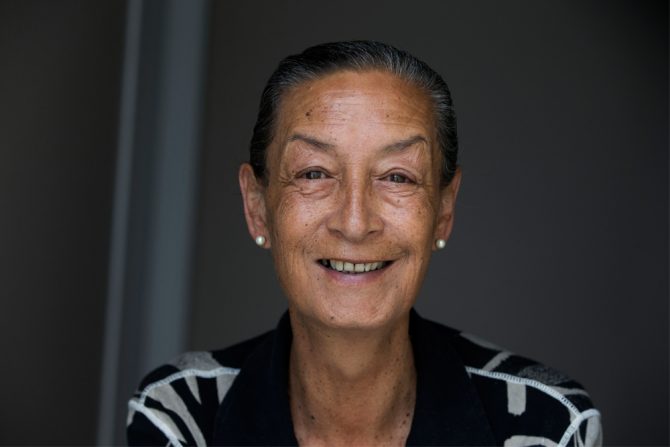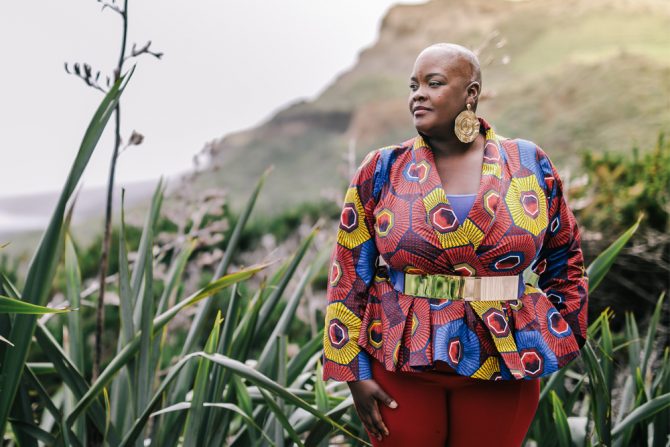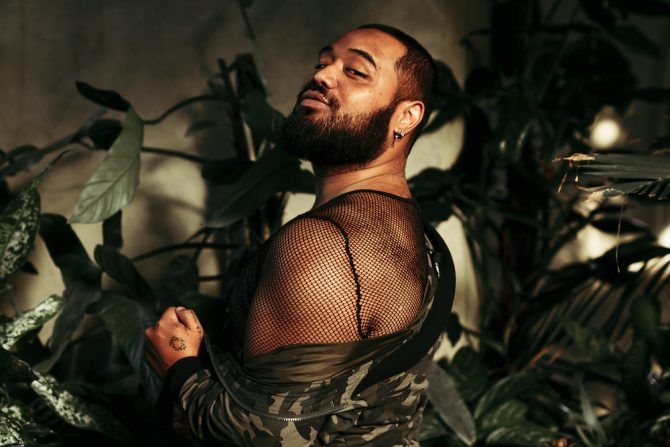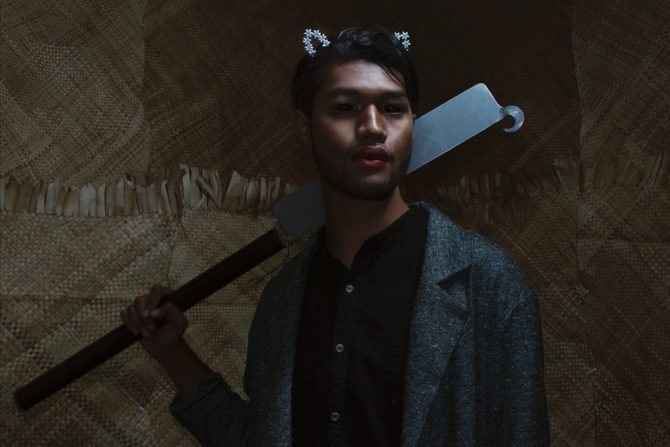Five eminent queer writers and artists gathered on Friday evening to speak on the topic of feeling comfortable in their skin, with personal responses to a personal topic.
Georgina Beyer (former politician, agitator for trans rights)
I felt wrong in my skin from the get go. It manifested itself at four years of age with my play behaviour tending towards the more feminine – which was seen as cute and funny for a while, until I grew older and I was disciplined out of it because it had become embarrassing (for them). It didn't make the behaviour go away, I just became more secretive. It's very damaging to make someone suppress that, very cruel... Later, I met friends who could sense that there was more to me than just George.
Unfortunately being liberated as Georgina didn't go down well with her bosses at the time, who felt being seen in women's clothing undermined the character they were portraying on a popular TV soap opera. The feeling of being comfortable in her own skin was too good to pass up for the sake of a TV show so that fell by the wayside with no regrets.
When asked who would play her in the movie of her life, Georgina caused amusement with her reply: "Well, it has to be a transsexual actor. Hopefully of Māori descent, as I am. JLo?"
Sonya Renee Taylor (poet, writer, activist)
What is radical self love? Radical self love is who you already are. You came here that way. No one sees a self-loathing three year old saying "I hate my thighs!" because toddlers think they're awesome. Radical self love is the inherent uncompromising idea that you are worthy just as you are, with no external factor that can lessen your inherent worthiness. Self confidence is nice, but the reality is it's fleeting. Radical self love proposes that regardless of how I feel I am still enough, even when I feel like shit.
Her thoughts on self deprecation: "A lot of comedians use this. It still relies on a hierarchy of bodies, even if you decide you're okay at the bottom it still leaves the hierarchy in place. Self deprecation is: Let me hit me first. It's a response to an oppressive world, if I slap me first then you won't slap me. Let's make this a world where no one has to be slapped!"
How did she get to where she is now? The Body is Not an Apology started out of a conversation with a friend where they opened up about feeling they couldn't demand safety as a sexual partner due to their cerebral palsy, whereupon Sonya replied: "Your body is not an apology. It's not something to offer up to say sorry for your disability. What would the world look like if we both stopped apologising for our bodies?"
How to stop being apologetic about your body? "Think about your daily intake of media. It's trash! Intentionally or unintentionally we are taking in tremendous amounts of body shame messages from morning to bed: Are your teeth white enough? Is your hair turning grey? What's that cellulite? Practice some intentionality and notice what you're taking in, then be intentional about removing it."
Part of the work of radical self love is recognising whose agenda is your self hate? Who profits from you hating yourself and the bodies of others? We are operating in a system that makes a lot of money keeping us invested in being lesser or greater than other bodies. There is no peace if peace is hinged on the erosion of someone else's spirit. When we divest from that system it becomes less powerful, and then we get the power back. And then we change the world.
Pati Solomona Tyrell (interdisciplinary visual artist)
When asked about the creation of FAFSWAG he spoke about how he was lucky to have a great foundation and support in his family, but they could never truly understand the experience of being queer and what that meant. It was important to find a group of friends and have somewhere outside of the church to share those experiences as queer Pacifica are not afforded space in society — nights at FAFWAG are a safe, free space just for them, where they can reclaim mana and power.
On faith:
I'm the only non-Christian person in my family now. Colonisation destroyed a lot of spirituality practices in the Pacific, so I'm trying to find spirituality through nature and a connection to land in my artwork.
Was he comfortable in his skin growing up? Uh, no.
I grew up in a conservative family, took 18 years to come out. Having to hold something back from them wrecked me, I found it hard to keep that big part of my identity away from my family. I needed to let go of my fear and be comfortable in myself. I was fortunate that they said everything I wanted to hear... Imagine what a world without family would be. I think [support from families] is slowly becoming more the norm, the more I meet other queer Pacifica kids and hear their stories, it seems to be a slowly growing positive experience.
Manuha'apai Vaeatangitau (artist)
Manuha'apai had a more negative experience, shifting between different islands growing up and having to align himself within those spaces every time. Going to a Catholic boys' school in South Auckland made things worse, with violence and confrontation a constant from his peers. At home things weren't much better — coming out at age 15 wasn't met with a positive reception. He spoke about the impact of colonisation on Polynesian culture and especially the insecurity Polynesian men can have about their masculinity, policing anyone for displaying femininity. The introduction of the church has a lot to answer for. "We bear the burden of that in our communities, we carry their shame as well as our own."
It's made me very resilient. My search for comfortability came with a burning fiery anger: You're going to be comfortable now, here, or you're gonna die trying.
When asked if he felt his generation had it worse or better than those previous, Manu shrugged off the question.
I think it's plurality... We'll all still be drowning in the ocean no matter how deep we are. It's pointless comparing because we all have colonisation in common. It's a waste of energy.
...Which dovetails nicely with Sonya's point about being supportive of each other rather than putting ourselves and others in a hierarchy.
- Follow our coverage of WORD Christchurch Festival 2018







Add a comment to: Comfortable in Your Skin: WORD Christchurch Festival 2018